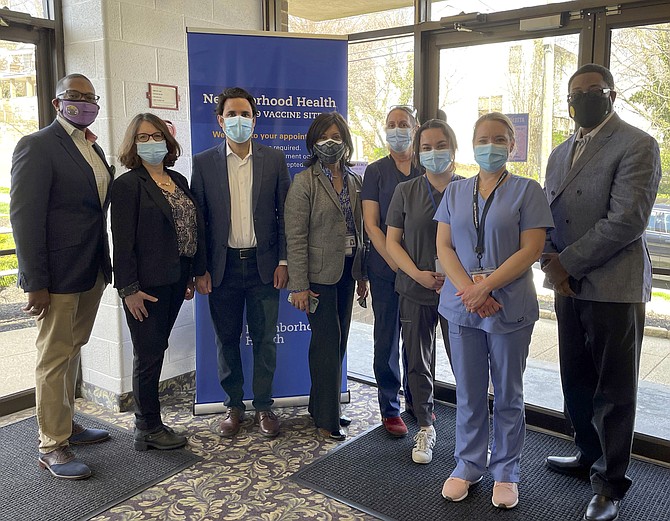COVID-19 Vaccine partnership leaders pose at Macedonia Baptist Church in Arlington. Left to Right: Rev. Craig Harcum from the church; Neighborhood Health staff Martha Welman, M.D., Basim Khan, M.D., Cynthia Sturdevant, Mary Hill, Amanda Hirsch, and Jessica McKee; and Lamont West, Trustee of the Macedonia Baptist Church. Photo contributed
When Amanda Hirsch looks out at the vaccine clinic running very smoothly, a sense of satisfaction comes over her – a feeling that Neighborhood Health’s efforts are helping to bring an end to the pandemic, especially within the communities hardest hit by it. Hirsch works for Neighborhood Health, serving the City of Alexandria, and Arlington and Fairfax counties. Since the start of the pandemic, the health center has been on the front lines providing health care to their low-income, mostly uninsured, and ethnically and racially diverse patients.
While the pace of Virginia COVID-19 vaccine rollout has been picking up in recent weeks, racial and ethnic disparities persist. According to the Virginia Department of Health (VDH), Black and Latino individuals have been vaccinated at the rate of approximately 11,000 per 100,000 people compared to 17,000 per 100,000 to White individuals.
Neighborhood Health has provided more than 15,000 vaccines with 85% going to people of color. It has set up seven community-based vaccine clinic sites located in churches, community centers, and other venues. These are located in target areas such as the Richmond Highway corridor in Mount Vernon, in Arlandria/Chirilagua, and in Bailey’s Crossroads. Organizations that have provided space include the Alfred Street Baptist Church, Virginia Theological Seminary, Knights of Columbus, and the Macedonia Baptist Church.
In addition to vaccinating their own patients and their household members, Neighborhood Health – following Virginia Department of Health guidelines – is working to target the underserved more broadly. It is working with almost 100 community organizations, including non-profits, faith organizations, and local agencies to vaccinate their clients. Staff from community organizations conduct individualized outreach through phone, text, or email to sign their clients up for the vaccine.
Neighborhood Health schedulers follow up to get the client an appointment time at a convenient location, usually within a week of the initial referral. Some of the larger nonprofits and local government agencies are given a certain number of appointment slots at Neighborhood Health vaccine clinics that they can fill with their clients so that a scheduling call from Neighborhood Health is not needed.
Dr. Basim Khan, Neighborhood Health’s Executive Director, talks about the heroic efforts throughout the community to get people in need vaccinated. “We are excited that faith-organizations, nonprofits and local government agency partners are conducting outreach and connecting their clients to us – people who currently qualify under the VDH guidelines but who might have difficulty accessing the vaccines due to technology, literacy, language, or other barriers.” So, in addition to its own qualifying patients, Neighborhood Health is able to reach underserved communities more broadly by partnering with African American churches, Latino and Asian American organizations and nonprofits in food assistance, legal and affordable housing, tenant rights and social services, and more. Neighborhood Health’s own bilingual outreach team is going directly to local small businesses such as ethnic grocery stores and restaurants to help schedule their staff for vaccines. The enthusiasm is palpable.
Dr. Martha Welman, Neighborhood Health’s Medical Director says that when vaccines first became available, the big goal was to offer 2,000 vaccinations per week. “But now, with our recent access to additional vaccine supply directly from the federal government, we anticipate administering up to 5,000 per week by early April. It is such a rewarding feeling to know we are meeting the needs of the community.”
Most people arriving at the vaccine sites are excited, if a little nervous. But the overwhelming emotion seems to be gratitude. Hopkins House, a local nonprofit that offers early childhood education and career development programs has referred multiple qualifying clients and staff for vaccination. J. Glenn Hopkins, President and CEO, says that one of their referrals who got vaccinated “is extremely grateful. She tells me it has relieved a great deal of personal stress, given the burden of her other health issues. She asked that I thank you ‘from the bottom of my heart.’”
